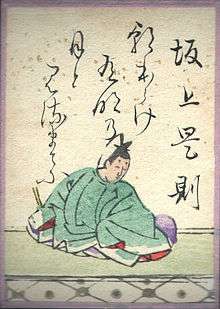Sakanoue no Korenori
Sakanoue no Korenori (坂上是則) was a Japanese waka poet of the early Heian period.[1] His exact dates of birth and death are unknown,[1][2] but he was a fourth-generation descendant of Sakanoue no Tamuramaro.[1]

He was one of the Thirty-six Immortals of Poetry[1][2] and one of his poems was included in the Ogura Hyakunin Isshu.[3][4] Forty-one of his poems were ultimately included in the imperial anthologies.[2]
He was the father of the poet Mochiki (望城, d. 975).[1][5]
During his own life he was known primarily as a champion kemari player.[2] On March 2, 905, he and his colleagues kicked a ball 206 times without interruption at the Imperial Court, and were praised by the emperor.
He served as governor of Kaga Province.[2]
Poetry
One of his poems was included as No. 31 in Fujiwara no Teika's Ogura Hyakunin Isshu:
| Japanese text[4] | Romanized Japanese[6] | English translation[3] |
|
|
|
References
- Daijisen entry "Sakanoue no Korenori". Shogakukan.
- McMillan 2010: 137.
- McMillan 2010: 33.
- Suzuki et al. 2009: 44–45.
- Keene 1999: 329 (note 4).
- McMillan 2010: 161.
Bibliography
- Keene, Donald (1999). A History of Japanese Literature, Vol. 1: Seeds in the Heart — Japanese Literature from Earliest Times to the Late Sixteenth Century. New York: Columbia University Press. ISBN 978-0-231-11441-7.
- McMillan, Peter (2010). One Hundred Poets, One Poem Each. New York: Columbia University Press. ISBN 978-0-231-14399-8.
- Suzuki, Hideo; Yamaguchi, Shin'ichi; Yoda, Yasushi (2009). Genshoku: Ogura Hyakunin Isshu. Tokyo: Bun'eidō. ISBN 4-578-10082-0.